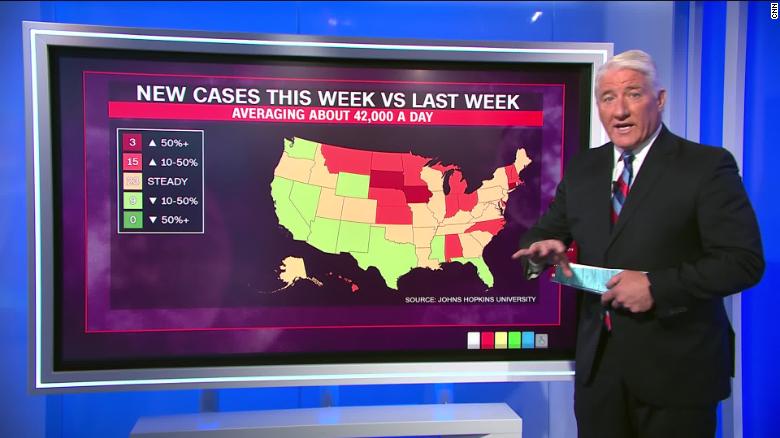"Do the right thing today," Dr. Deborah Birx said. "Because if we do the right thing today, we go into the fall with much fewer cases."
As researchers race to develop a vaccine to get control of the virus that has infected
more than 5.9 million people and killed 183,066 in the US, health experts and officials continue to say preventative measures, such as wearing a mask, practicing social distancing and avoiding crowds can keep infections low and economies open in the interim. But as the pandemic drags on, experts worry that the public has become fatigued or complacent in those measures.
"Right now, we gain freedom through wearing our masks and socially distancing," Birx said.
She urged vigilance, noting that crowds gathered at concert venues can spread the virus, but so too can people gathered in a backyard.
"We know we can't always be perfect. We know that we'll put this message out about private gatherings and something will happen and you'll realize you have been in a situation, you've been around people, you didn't have your mask on," Birx said. "That is the time to make sure you're protecting others in your household and around you by wearing a mask when you're around them, even if they're family."
Vaccine reviews look to increase public trust
Birx said she is hopeful that Americans will choose to get vaccinated once the data becomes available to show that the vaccines in the works are safe and effective.
A CNN poll this month shows that 40% of Americans do not want to get a coronavirus vaccine when it becomes available, even if it's free and easy to access. Such a low uptake of the vaccine could hinder the ability to get the virus under control and return to normalcy.
To increase public trust, several prominent physicians and experts have called for the creation of an independent commission separate from the Food and Drug Administration to review the data from coronavirus vaccine trials.
"I'm hearing this from my peers, from doctors and nurses. They're not anti-vaxxers. They're pro vaccine. They vaccinated their own children. But they are skeptical about this vaccine," said Dr. Kathryn Stephenson, director of the clinical trials unit at the Center for Virology and Vaccine Research at Beth Israel Deaconess Medical Center.
Part of the problem is that the FDA is perceived as tainted because of a premature authorization of hydroxychloroquine and convalescent plasma, said Dr. Rochelle Walensky, chief of infectious diseases at Massachusetts General Hospital.
But Paul Mango, deputy chief of staff for policy at the US Department of Health Human Services, said the eventual approval of the coronavirus vaccine will be the same as for any vaccine.
"There is a thing called a Data Safety Monitoring Board, an independent body that is assigned to each clinical trial," Mango said during a telephone briefing. "We have no insight into the data until the DSMB says we can look at it. They can come back and say, 'This is not a good vaccine.' They could come back before we even have 30,000 folks enrolled and say 'We have enough. This looks great.'"
Florida and Georgia see numbers decline
Though the number of cases is still climbing nationwide, at least two states that had previously seen a surge are now reporting some improvement.
The Georgia Department of Public Health reported 1,298 new Covid-19 cases on Sunday, marking the first time the state has reported fewer than 1,300 daily cases in more than two months.
Florida, meanwhile, reported its lowest daily death figure in months on Sunday: 14.
Neither state has reached those benchmarks since June 22.
Florida and Georgia both are among the top five states in the country in terms of total infection counts.
'We have power against this virus, but it requires all of us to exert our power together'
Coronavirus continues to be a serious threat in the US, but knowledge gained about the virus over the last six months means Americans have power against it, Birx said.
"We see the numbers on the TV and in the news every single day of the number of Americans who have lost their lives to this virus. We don't lose that many Americans to a virus like the flu virus every year," Birx said during a media appearance in Minnesota. "So, this is a serious threat."
But, she said, the US knows how to stop transmission.
The last six months of the pandemic have provided insight into why masks are important, that homemade two-ply masks are effective and the physical distancing is important, Birx said.
"Not only is the virus real, the consequences of the virus is real. The hospitalizations that we still have every week is real. The number of Americans that we have lost to this virus are real," Birx said. "But what is also real is we have a way to prevent its spread, and I think this really needs to be a balanced message of 'we have power against this virus, but it requires all of us to exert our power together.'"
CNN's Elizabeth Cohen, Naomi Thomas, Natasha Chen, Melissa Alonso and Maggie Fox contributed to this report.



















